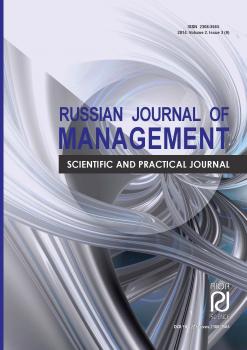student from 01.01.2023 to 01.01.2025
Moscow, Moscow, Russian Federation
VAK Russia 5.2.3
VAK Russia 5.2.4
VAK Russia 5.2.5
VAK Russia 5.2.6
VAK Russia 5.2.7
UDC 338.43
CSCSTI 82.33
The article discusses the specifics of incorporating climate risks into corporate governance systems, using companies in the marine fishing and fish farming sector as examples. The relevance of the study is due to the need for businesses to adapt to increasing climate threats and regulatory requirements in the field of sustainable development. The method used is a qualitative comparative analysis of three companies demonstrating different levels of maturity in their management approaches. Three models have been identified: full integration of climate factors into strategic management, technological adaptation without institutional formalisation, and initial institutionalisation with limited disclosure of information. It was found that only with specialised management structures, climate indicators and transparent reporting do companies demonstrate high adaptability to climate risks. At the same time, companies without a sustainable management architecture are limited in their ability to respond strategically.
ESG management, non-financial reporting, climate risks, corporate sustainability, institutional development, disclosure of information, aquaculture, climate change adaptation, business model transformation.
1. Bataeva B.S., Karpov N.A. The influence of corporate governance factors on the level of ESG information disclosure by Russian public companies // Manager. 2023. Vol. 14. No. 3. Pp. 30-43.
2. Inarctica. Reports and results [Electronic resource]. – Access mode: https://inarctica.com/investors/reports-and-results/ (date of access: 26.06.2025).
3. Tkachenko I.N., Savchenko Ya.V. Scientific review of methods and tools for researching and evaluating ESG transformation in business// Economics. Profession. Business. 2024. No. 3. https://cyberleninka.ru/article/n/nauchnyy-obzor-metodov-i-instrumentariya-issledovaniya-i-otsenivaniya-esg-transformatsii-v-biznese/viewer
4. Albrektsen S., Langmyhr E., Mørkøre T., Aas T. S. Future feed resources in sustainable salmonid production: A review // Reviews in Aquaculture. – 2022. – Vol. 14, № 3. – P. 1144–1165. – DOI:https://doi.org/10.1111/raq.12670.
5. Andersen L. B., Grefsrud E. S., Svåsand T., Sandlund N. Risk understanding and risk acknowledgement: a new approach to environmental risk assessment in marine aquaculture // ICES Journal of Marine Science. – 2022. – Vol. 79. – P. 987–996. – DOI:https://doi.org/10.1093/icesjms/fsac028.
6. CRFM (Caribbean Regional Fisheries Mechanism). Climate Change Adaptation and Disaster Risk Management in Fisheries and Aquaculture in the CARICOM Region: Regional Strategy and Action Plan 2020–2030. – CRFM Technical & Advisory Document Series. – No. 2020/02. – 63 p. – ISBN: 978-976-8293-28-2.
7. Elkington J. Cannibals with Forks: The Triple Bottom Line of 21st Century Business. Oxford: Capstone, 1997.
8. Engler C. Fit for purpose? Evaluating climate change adaptation laws and policies for marine aquaculture in Chile // Frontiers in Marine Science. – 2024. – Vol. 11. – Article ID 1386545. – DOI:https://doi.org/10.3389/fmars.2024.1386545.
9. FAO. The State of World Fisheries and Aquaculture 2022: Towards Blue Transformation. Rome: Food and Agriculture Organization of the United Nations, 2022. . URL: https://openknowledge.fao.org/items/11a4abd8-4e09-4bef-9c12-900fb4605a02 (date of access: 26.06.2025
10. Froehlich, H. E., Gentry, R. R., & Halpern, B. S. (2018). Global change in marine aquaculture production potential under climate change. Nature ecology & evolution, 2(11), 1745-1750.
11. Galappaththi E. K., Ichien S. T., Hyman A. A., Aubrac C. J., Ford J. D. Climate change adaptation in aquaculture // Reviews in Aquaculture. – 2020. – Vol. 12, № 4. – P. 2160–2176. – DOI:https://doi.org/10.1111/raq.12427.
12. Galappaththi E.K., Ford J.D., Bennett E.M., Berkes F. Climate Change and Aquaculture: A Global Synthesis of Knowledge // Reviews in Aquaculture. 2020. Vol. 12(4). Pp. 2345–2364. DOI:https://doi.org/10.1111/raq.12418.
13. Grieg Seafood Annual Report 2023 URL: https://storage.mfn.se/a/grieg-seafood/e874a39c-b007-4f2d-828f-ac9433378cf7/gsf_annualreport23_update_240322.pdf (date of access: 27.06.2025).
14. Intergovernmental Panel on Climate Change (IPCC). Sixth Assessment Report – Working Group II: Impacts, Adaptation and Vulnerability. Geneva: IPCC, 2022. URL: https://www.ipcc.ch/report/ar6/wg2/ (date of access: 26.06.2025.
15. International Financial Reporting Standards Foundation. IFRS S2: Climate-related Disclosures. London: IFRS Foundation, 2023. URL: https://www.ifrs.org/issued-standards/ifrs-sustainability-standards/ (date of access: 26.06.2025.
16. Korzeb Z., Niedziółka P., Węgrzyn A. ESG Reporting and Risk Management in the Banking Sector // Journal of Risk and Financial Management. 2024. Vol. 17(1). Art. 25. DOI:https://doi.org/10.3390/jrfm17010025.
17. Mowi Integrated Annual Report 2024 URL: https://mowi.com/wp-content/uploads/2025/03/Mowi-Integrated-Annual-Report-2024.pdf (date of access: 27.06.2025).
18. Murray F. J., Gubbins M., Gill A. B., Fitzsimmons C. Climate change impacts on marine aquaculture: Challenges and adaptation strategies // Reviews in Aquaculture. – 2022. – Vol. 14, № 1. – P. 56–74. – DOI:https://doi.org/10.1111/raq.12629.
19. North D.C. Institutions, Institutional Change and Economic Performance. Cambridge: Cambridge University Press, 1990. 152 p.
20. Ozkan A., Karatas S., Demir V. Disclosure of Climate-Related Financial Risks and Corporate Performance: Evidence from the EU Seafood Sector // Sustainability. 2023. Vol. 15(2). Art. 1246. DOI:https://doi.org/10.3390/su15021246.
21. Scott W.R. Institutions and Organizations: Ideas, Interests and Identities. 4th ed. Thousand Oaks: SAGE Publications, 2014. 360 p.
22. Task Force on Climate-related Financial Disclosures (TCFD). Final Report: Recommendations of the Task Force on Climate-related Financial Disclosures. Basel: Financial Stability Board, 2017. URL: https://www.fsb.org/2017/06/recommendations-of-the-task-force-on-climate-related-financial-disclosures/ (date of access: 26.06.2025.
23. United Nations Global Compact. Who Cares Wins: Connecting Financial Markets to a Changing World. New York: UNGC, 2004. URL: https://documents1.worldbank.org/curated/en/280911488968799581/pdf/113237-WP-WhoCaresWins-2004.pdf (date of access: 26.06.2025.
24. World Economic Forum. Global Risks Report 2024. 19th ed. Geneva: WEF, 2024. URL: https://www.weforum.org/publications/global-risks-report-2024/ (date of access: 26.06.2025.
25. Yadav N. K., Patel A. B., Singh S. K., Verma D. K. Climate change effects on aquaculture production and its sustainable management through climate-resilient adaptation strategies: a review // Environmental Science and Pollution Research. – 2024. – Vol. 31. – P. 31731–31751. – DOI:https://doi.org/10.1007/s11356-024-33397-5.
26. Yin, Z., Deng, R., Xia, J., & Zhao, L. (2024). Climate risk and corporate ESG performance: Evidence from China. The North American Journal of Economics and Finance, 74, 102245.
27. Zitti, M., & Guttormsen, A. G. (2023). Climate risk and financial disclosure in salmon aquaculture. Aquaculture Economics & Management, 27(3), 441-467.














